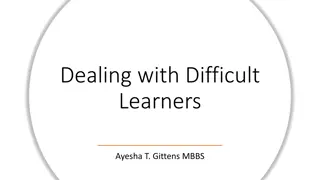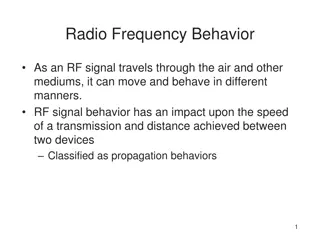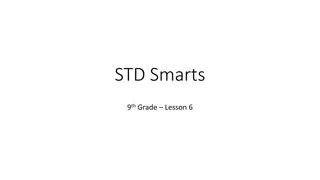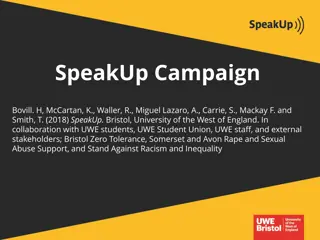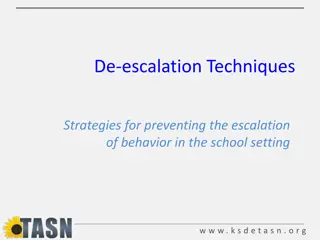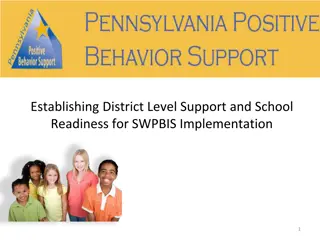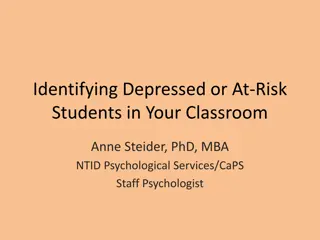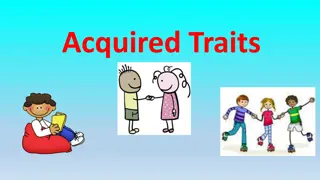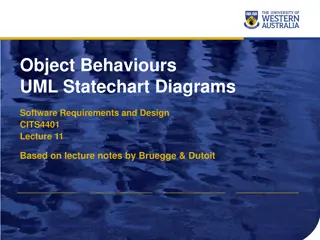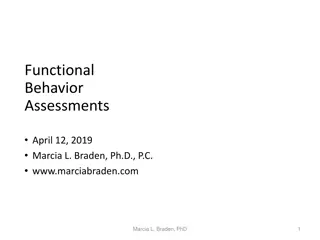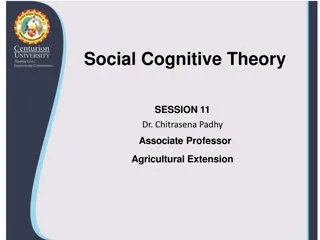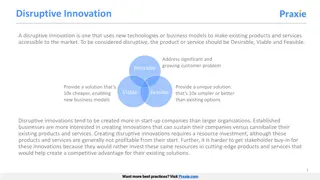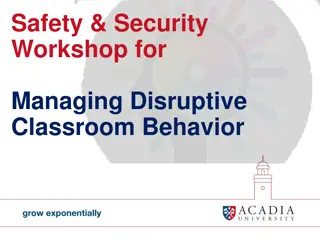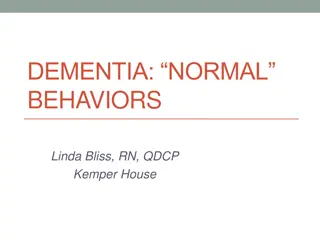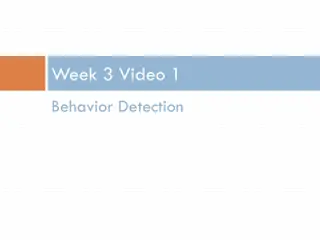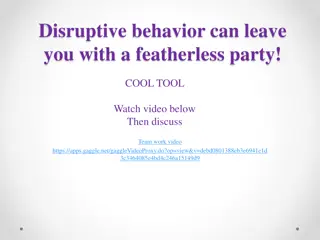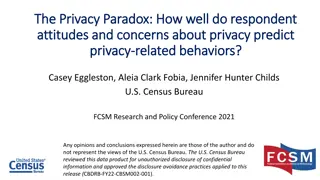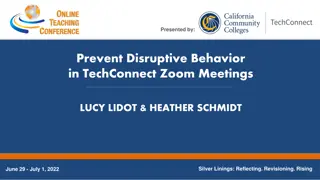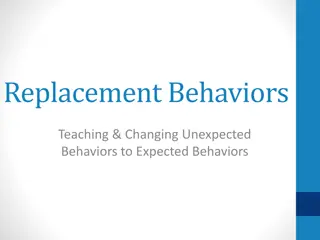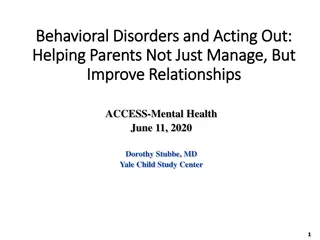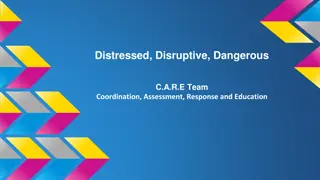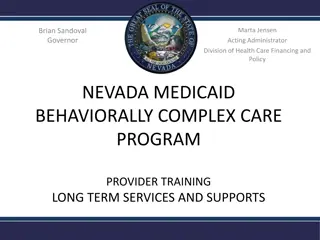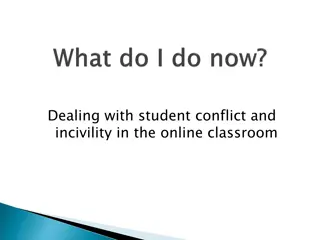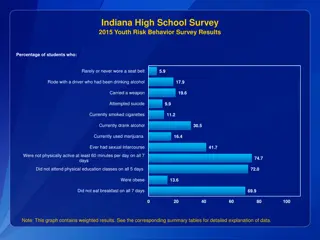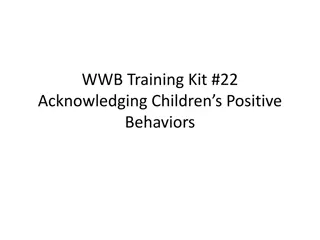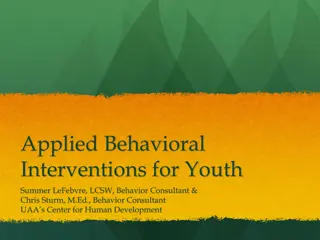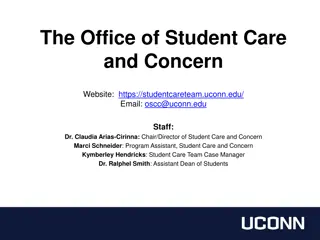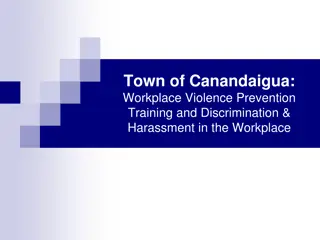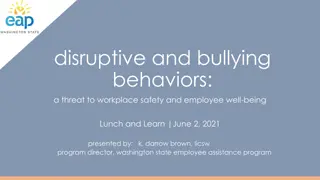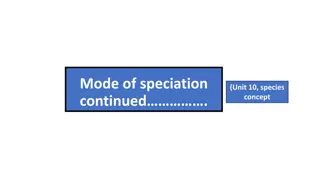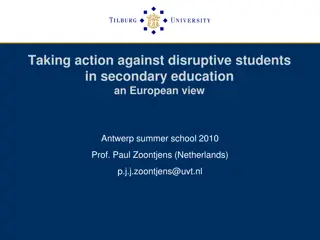Understanding and Managing Difficult Learner Behaviors in Adult Education
Dealing with difficult learners in adult education settings can impact the learning experience for all. This guide covers types of challenging behaviors, identifying underlying causes, and strategies for maintaining a constructive educational environment. By addressing disruptive behaviors effective
1 views • 32 slides
Understanding Changes in Domestic Abuse Practices Over the Last 2 Years
In the realm of domestic abuse and coercive control, there have been notable developments in practice over the past two years. From defining behaviors that constitute domestic abuse to recognizing economic abuse and the impact of coercive and controlling behaviors, the legal landscape has evolved to
6 views • 30 slides
Understanding Radio Frequency Behavior and Propagation Behaviors
Radio frequency signals exhibit various behaviors as they travel through different mediums, affecting transmission speed and distance between devices. Propagation behaviors include absorption, reflection, scattering, refraction, and diffraction, impacting wireless network performance. Understanding
2 views • 32 slides
STD Smarts 9th Grade Lesson: Risky Behaviors and STD Testing
In this 9th grade lesson on STD Smarts, students explore risky behaviors related to STD transmission and delve into the importance of STD testing. The lesson covers various scenarios and myths surrounding STDs, challenging students to consider their choices and knowledge about sexual health. Through
0 views • 32 slides
Understanding Sexual Violence and Harassment in Educational Settings
Sexual violence and harassment, including rape, sexual assault, and unwanted sexual behaviors, are serious issues that can affect anyone. This content highlights what sexual violence is, who can experience it, and the impact it has on students in educational environments. It also covers sexual haras
1 views • 27 slides
Effective De-escalation Techniques for School Settings
Explore strategies and techniques for preventing behavior escalation in schools based on the work of experts like Dr. Geoff Colvin and Dr. George Sugai. Understand the importance of managing disruptive behaviors, proactive interventions, and stages of escalating behavior. Discover how to become flue
1 views • 52 slides
Clinical Excellence in Nursing: SCENS Simulations for Disruptive Behavior Management
SCENS provides simulations focusing on Prevention and Management of Disruptive Behavior (PMDB) in nursing services, emphasizing safety protocols and effective communication. The training covers early signs of escalating behavior, stress levels recognition, and interventions to handle disruptive situ
0 views • 19 slides
Disruptive Technologies: Innovating Small and Low-Power Sensors
Specializing in small, low-power sensors, Disruptive Technologies offers the world's smallest wireless sensor with strong security features. Their cloud-based platform allows monitoring of various parameters like temperature, humidity, and proximity. Learn how to set up their API, create connectors,
0 views • 12 slides
Comprehensive Information on Alcohol Withdrawal Syndrome and Clinical Excellence in Nursing Services (SCENS)
Explore the complexities of Alcohol Withdrawal Syndrome (AWS) and learn about managing disruptive patient behaviors during withdrawal scenarios through the Simulations for Clinical Excellence in Nursing Services (SCENS). Discover the significance of establishing safety, implementing assessment proto
0 views • 19 slides
SWPBIS Implementation: Establishing District Support and School Readiness
Positive Behavioral Interventions and Supports (PBIS) focuses on creating effective environments to encourage appropriate behaviors. SWPBIS extends this approach to whole schools, applying systemic strategies to achieve positive outcomes and prevent problem behaviors. It is not a quick fix or just a
2 views • 18 slides
Understanding Multiple Baseline Designs in Behavioral Experiments
Multiple Baseline Designs are a type of experimental design used in behavioral research. This design involves measuring two or more behaviors concurrently in a baseline condition, applying a treatment variable to one behavior at a time while maintaining baseline conditions for others, and then seque
0 views • 34 slides
Identifying Depressed or At-Risk Students in Your Classroom
This presentation by Anne Steider, PhD, MBA from NTID Psychological Services highlights strategies for identifying and supporting students who may be struggling with depression or at-risk behaviors in a classroom setting. It discusses the importance of distinguishing between disruptive and distresse
0 views • 24 slides
Managing Difficult Employees and Disruptive Behaviors
Identify common types of difficult and disruptive employee behaviors, discuss the potential impact on the organization, and offer tips for constructive management in the workplace. Explore behaviors like gossiping, incivility, bullying, insubordination, and arrogance. Understand the metrics and lega
1 views • 20 slides
Understanding Acquired Traits and Learned Behaviors in Living Organisms
Acquired traits are physical characteristics acquired during a living thing's lifetime, such as scars, and are not passed down from parents. Many acquired traits are also learned behaviors, like reading or flying, which animals develop after birth. Learned behaviors, unlike inherited instincts, are
5 views • 15 slides
Understanding Object Behaviors and Statechart Diagrams in Software Design
Object behaviors and UML statechart diagrams play a crucial role in software requirements and design. State machines, transitions, events, and states are essential concepts in modeling object behavior in response to external events. By utilizing UML statechart diagrams, one can effectively represent
0 views • 23 slides
Understanding Functional Behavior Assessments for Supporting Students
Functional Behavior Assessments (FBAs) play a crucial role in supporting students with behavioral needs by identifying the reasons behind inappropriate behaviors. This approach, led by professionals like Marcia L. Braden, Ph.D., helps define interventions, prevent problems, and teach alternative beh
1 views • 51 slides
Understanding Social Cognitive Theory: Insights from Albert Bandura
Social Cognitive Theory, developed by Albert Bandura, emphasizes learning through observation and modeling behaviors. The theory explores how individuals acquire new behaviors, thoughts, and attitudes by observing others. Bandura's famous Bobo doll experiment showcased how children imitated aggressi
6 views • 17 slides
Exploring Disruptive Innovation Potential
Disruptive innovation involves introducing new technologies or business models to address significant customer problems by offering solutions that are 10 times cheaper, simpler, or better than existing options. While disruptive innovations may not be immediately profitable, they have the potential t
0 views • 5 slides
Workplace Safety and Security Workshop: Managing Disruptive Behavior
Exploring workplace violence, the right to refuse work, and strategies to prevent and address disruptive behavior in the classroom environment. Learn about identifying workplace violence, exercising your right to refuse unsafe work, and creating positive partnerships for safety and security.
2 views • 21 slides
Understanding Normal Behaviors in Dementia Care
Dementia presents a range of normal behaviors that can be challenging for caregivers. By learning to identify triggers, interpret communication, and respond effectively, caregivers can provide better support for individuals with dementia. This session explores common behaviors like aggression, wande
0 views • 29 slides
Understanding Behavior Detection Models in Educational Settings
Explore how behavior detectors automatically infer student behaviors from interaction logs, such as disengaged behaviors like Gaming the System and Off-Task Behavior, as well as Self-Regulated Learning (SRL) behaviors like Help Avoidance and Persistence. Discover the goal of identifying these behavi
0 views • 18 slides
Understanding and Addressing Disruptive Behavior in School: A Team Approach
Disruptive behavior in school can negatively impact the learning environment for everyone. This content provides insights into what disruptive behavior entails, why it is inappropriate, alternative actions to promote a safe learning environment, and emphasizes the importance of being a team player i
0 views • 5 slides
Understanding the Privacy Paradox: Attitudes vs. Behaviors
Social scientists have identified a Privacy Paradox where individuals with strong privacy concerns may not always engage in behaviors that protect their privacy. While some studies show a discrepancy between attitudes and behaviors, others suggest that privacy-concerned individuals do employ privacy
0 views • 14 slides
Prevent Disruptive Behavior in TechConnect Zoom Meetings - Silver Linings Event
Explore strategies to prevent disruptive behavior in TechConnect Zoom meetings at the Silver Linings event from June 29 to July 1, 2022. Learn about security risks, Zoom security options, managing meeting attendees, and ensuring a successful and secure meeting experience. Gain insights into handling
0 views • 32 slides
Understanding Replacement Behaviors in Behavioral Interventions
Dive into the concept of replacement behaviors in behavior modification strategies. Learn how to identify, teach, and implement expected behaviors to replace unwanted actions. Discover the role of the Child Study Team in developing action plans, prioritizing behaviors, and evaluating progress. Explo
0 views • 30 slides
Understanding Behavioral Disorders in Children: Strategies for Parents
Explore the complexities of behavioral disorders in children, including Oppositional Defiant Disorder, with a focus on helping parents enhance relationships and implement effective management techniques. Dive into the diagnostic process, treatment approaches, and co-occurring disorders, shedding lig
0 views • 28 slides
C.A.R.E. Team Coordination for Distressed, Disruptive, and Dangerous Situations
Collaborative C.A.R.E. Team at the university aims to proactively address distress, disruptive behavior, and dangerous situations by supporting students, preventing emergencies, and educating the community. The team includes various leaders from student life, counseling, safety, and more, originatin
0 views • 18 slides
Understanding Antisocial Behavior in Children and Adolescents: Risk Factors and Implications
Exploring the development of disruptive behaviors in children and adolescents, this content sheds light on the risk of evolving into an antisocial lifestyle. It discusses various factors such as early onset, organized crime influence, lack of support structures, and educational challenges. Additiona
0 views • 45 slides
Nevada Medicaid Behaviorally Complex Care Program Overview
The Behaviorally Complex Care Program (BCCP) in Nevada provides specialized care for Medicaid recipients with medically-based behavior disorders. Established in 2014, the program offers tiered rate services for individuals posing a danger to themselves or others. Eligible recipients must be over 18
0 views • 16 slides
Dealing with Student Conflict and Incivility in Online Classrooms
Classroom incivility encompasses disruptive behaviors that hinder a conducive learning environment. It affects both students and instructors, leading to stress and discontent. Various uncivil behaviors include dominating discussions, challenging instructors, disputes between students, and demeaning
0 views • 19 slides
Indiana High School Survey 2015 Youth Risk Behavior Results
The Indiana High School Survey 2015 provides valuable insights into the risk behaviors of high school students in Indiana. The survey results reveal concerning percentages of students who engage in behaviors such as not wearing seat belts, riding with drivers who have consumed alcohol, carrying weap
0 views • 4 slides
Influence of Teachers on Disruptive Behavior Among Senior Secondary School Students in Imo State, Nigeria
This study examines the impact of teachers' qualifications, experience, marital status, and gender on disruptive behavior among senior secondary school students in Imo State, Nigeria. Findings suggest that teachers' qualifications and experience significantly influence student behavior. Recommendati
0 views • 24 slides
Understanding Positive Behavior Acknowledgment in Children
Acknowledging children's positive behaviors is crucial for reinforcing desired behavior patterns. Positive responses help in promoting positive interactions, following instructions, proper communication, and independent self-care skills. It is important to recognize and praise positive behaviors to
0 views • 11 slides
Understanding Applied Behavior Analysis (ABA) for Youth Interventions
Applied Behavior Analysis (ABA) is a science focusing on improving human behavior by increasing desired behaviors, teaching new skills, and generalizing behaviors. ABA emphasizes observable behaviors, measurement of behavior change, and the use of interventions in various settings like classrooms an
0 views • 25 slides
Student Care and Concern Team Overview at UConn
The Student Care and Concern Team at UConn is a multidisciplinary group that evaluates and responds to behaviors of students that may be threatening, harmful, or disruptive. The team collaborates with various university departments to provide comprehensive support and intervention services. In situa
0 views • 21 slides
Workplace Violence Prevention Training & Discrimination in the Workplace
Workplace violence prevention training is crucial to ensure safety in the workplace. This training covers the definition of workplace violence, types of violence, actions that must be reported, and worst-case scenarios. It emphasizes avoiding disruptive behaviors like verbal abuse and outlines incid
0 views • 23 slides
Workplace Safety and Well-being Lunch and Learn Event Overview
This Lunch and Learn event held on June 2, 2021, addressed disruptive and bullying behaviors as threats to workplace safety and employee well-being. Key topics included identifying, addressing, and discussing such behaviors, along with statistics on civility in the workplace and challenges faced due
0 views • 26 slides
Sympatric Speciation: Evolution Without Geographic Isolation
Sympatric speciation involves the evolution of reproductive isolation without geographical barriers, leading to the splitting of an ancestral species into reproductively isolated groups within the same area. Possible reasons for reproductive isolation include disruptive selection, competition for re
0 views • 9 slides
Managing Disruptive Students in European Secondary Education
Disruptive behavior among students poses a significant challenge in secondary education across Europe, impacting the learning environment and teacher effectiveness. Polls reveal the prevalence of student misbehavior, prompting the need for action to maintain school peace, discipline, and uphold laws
0 views • 19 slides
Airline Passenger Incidents: A Disturbing Trend Unfolds
Incidents of unruly behavior on airplanes have been on the rise, prompting concerns for passenger safety. From fights over reclining seats to disturbing acts like groping and urinating, the incidents showcase a range of troubling behaviors. Factors like intoxication, frustration, and mental health i
0 views • 27 slides
